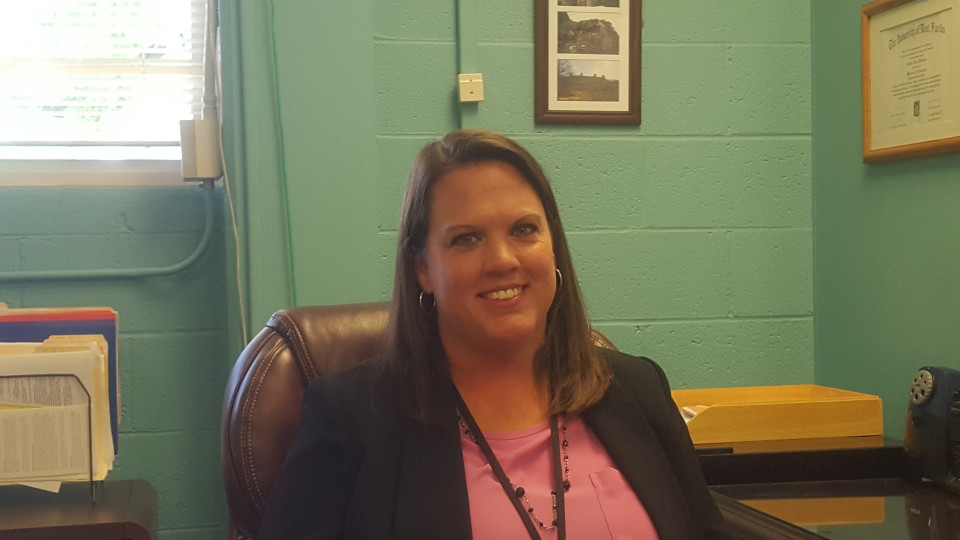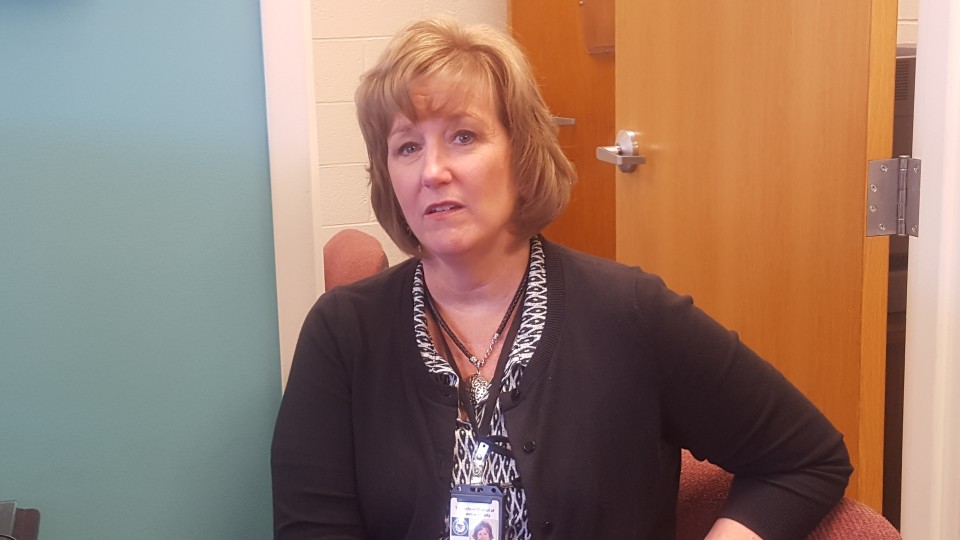Montclair Elementary looking inside and out to get back on top
- October 18, 2016
- / Reggie Dogan
- / early-learning,education,report-meeting-the-challenge

Students at Montclair Elementary School. Credit: Reggie Dogan.
This is the 10th in a series of installments on the improvement plans principals are implementing at the 11 Escambia County elementary schools that received a D or F on the Florida Standards Assessment.
ABOUT THIS SERIES
Learn how Weis Elementary is working to improve student learning from the earliest ages.
Learn how Holm Elementary is working to improvement achievement among its students.
Learn how Warrington Elementary plans to boost student achievement.
Learn how Sherwood Elementary focuses on parent outreach and teacher training for school improvement.
Learn how Global Learning Academy is striving to overcome the challenges of poverty to increase proficiency.
Learn how Lincoln Park Elementary is working to strengthen relationships among staff, parents and community.
Learn how Ensley Elementary is planning to boost math and reading skills as part of the school’s improvement plan.
Learn how Oakcrest Elementary is building stronger relationships to increase student learning.
Learn how West Pensacola Elementary is helping students and teachers get resources to improve academic achievement.
In 2011, Montclair Elementary School earned an A based on statewide test scores.
The neighborhood school surrounded by “pockets of poverty” off Massachusetts Avenue dropped a letter grade each year until receiving an F two years in a row.
The roller coaster from the bottom to the top and back to the bottom is atypical of many low-performing schools that serve students from distressed neighborhoods and disadvantaged homes.
First-year Principal Hollie Wilkins has faith that her students and staff can again rise to top as a high-performing A school.
“It’s not a low-performing school in the sense that we’re not working and we’re not trying hard and the teachers aren’t passionate and they aren’t putting all their blood, sweat and tears in it, because they are,” Wilkins said. “We have to just figure out how we need to work smarter rather than harder.”
Montclair today is one of 11 elementary schools in Escambia County that received a D or F on the Florida Standards Assessment test for 2016.
Montclair Elementary School, 820 Massachusetts Ave.
Enrollment: 370.
Staff: 23 teachers.
Demographics: Black is 95%, White is 2%, Hispanic is 2%, and multi-racial is 1%.
Free- or reduced-price lunch rate: 100%
In Escambia County, the School District added an extra hour to the school day for low-performing schools to focus on reading and writing. The schools also were required to submitted an improve plan.
Wilkins said a staff member spent the summer analyzing data and gave her the history of Montclair in an effort to show the dynamics of grade fluctuation.
“One of the things we saw is the students are losing proficiency over time,” Wilkins said. So, we’re brainstorming ideas of why we think that might be happening.”
They discovered that the low-performing students actually made learning gains to the demise of the better-performing students, who were being overlooked. Plans are in place to offer advanced classes for high-performing students in third and fourth grades.
“Those classes are going to look different than the other classes,” Wilkins said. “Of course, long-term, you’d want all the classes to look like the advanced classes because all students need that rigor, student engagement and that outside-the-box thinking.”
The hope is to put in place a model for other teachers to follow for every student, Wilkins said.
Of course, any successful turnaround can be nullified without quality teachers providing quality instruction.
At Montclair, teacher turnover has been a issue that has a hampered consistency and progress. Nearly half of Montclair’s 23 teachers are in this year.
It’s not always easy to attract and retain teachers at schools with high concentrations of low-performing, low-income students. Before moving to Monclair, Wilkins was principal at Bellview Elementary School. She spent half the summer hiring for Bellview and the other half hiring teachers for Montclair. She had nearly 20 applicants at Bellview, compared to only five or six at Montclair.
“There are teachers that won’t sub here, that won’t teach here, that won’t teach in a poverty school,” said Assistant Principal Kristen Danley.
For those that will, Wilkins knows what to look for when combing through applicants and holding interviews.
She probes to find out how much experience they have had working with families in poverty. She wants to know if they have the drive, the desire and the dedication to serve the students, their families and the community.
“They have to have a passion, a mission approach,” Wilkins said. “We look for people who feel like it’s their calling to be here, they want to be here.”
Getting the right teachers in the right place is an important part of improving low-performing schools and increasing academic proficiency for students.
One teacher from a local private school transferred to Montclair because she wanted the challenge of working in a different environment.
“She came her and she volunteered for a day and she said, ‘At the end of the day, I realized I didn’t need to come here to help them. I needed to come here so they could help me. These children and these families and this community can help me,’ ” Wilkins said. “She’s here now and she brought another teacher from that school, and they want to be here. It’s they’re mission.”
Improving failing schools is a challenge that takes more than the principal and teachers. It’s takes students, parents and even the community becoming stakeholders in the quest for high academic achievement.
And Wilkins is looking beyond the schoolyard to find some solutions.
The school has developed strong partnerships with businesses, agencies and churches that provide much-needed support and resources.
Circle K stores, the Escambia County Sheriff’s Office, Lakeview Baptist Church is among several organizations that donate school supplies, and snacks and treats for the Student Backpacks.
Gulf Power and the Navy provide classroom volunteers and tutors. Target opens its doors for Christmas shopping,
At low-performing schools like Montclair, parental involvement is especially crucial.
“The families across the street can help me and tell me what it is they need,” Wilkins said. “They spend time with their kids. They know. I’m going to ask them, ‘What can I do to help you’?”
In September, the school sponsored Reimagine Montclair, a community outreach service for families in the neighborhood.
Throughout the school year, Montclair holds family nights to improve parent engagement. They serve dinner and provide entertaining and educational activities.
“We try to provide as a service, whether it’s a dinner, a speaker, with some fun learning and tools for them to take home to use later with their kids,” Danley said. “It’s a fun way to get the parents into the school.”
Studies support what principals and teachers already know: Students perform better academically when schools build positive relationships with their families.
No matter the income or background, students with involved parents are more likely to have higher grades and test scores, attend school regularly, develop better social skills, demonstrate improved behavior and adapt to school easier.
An advantage in favor of parental engagement for Montclair is its location as a neighborhood school. The school needs only two buses because most of the students live within walking distance.
At dismissal, as parents walk up to the gate to pick up their children, teachers and principals can stop and have conversations, get paper signed or discuss any problems or concerns.
“If they’re having trouble in a classroom and they really want to get in touch with the parents, they just walk across the street,” Danley said. “A lot of teachers do that.”
Despite the low scores and the obstacles that living in high-poverty neighborhoods presents at Montclair, Wilkins believes the students can perform and that the teachers work hard each day to help them rise to the top.
The key to a turnaround at Montclair, Wilkins said, is not more people, more money, more teachers or longer hours at school. The solution is right in front of them in the classroom and across the street in the homes and neighborhood.
The children at this school will come in my office, and I’m going to ask them, ‘What do you need’?” I want to figure out what Montclair needs. I’m not trying to solve the nation’s problem,” Wilkins said. “We’re not low-performing, we just haven’t figured out all the pieces yet, but we’re going to.”



 CivicCon launches with a look at good growth in cities
CivicCon launches with a look at good growth in cities
 Building stronger brains one baby, one parent at a time
Building stronger brains one baby, one parent at a time
 SCI debuts commercial on Early Learning City
SCI debuts commercial on Early Learning City
 Entrecon: World class speakers and an opportunity to sharpen skills
Entrecon: World class speakers and an opportunity to sharpen skills
 PYP Quality of Life survey 2017
PYP Quality of Life survey 2017
 EntreCon Pensacola 2016: A look back
EntreCon Pensacola 2016: A look back
 Leadership tip: getting better employee takeaways
Leadership tip: getting better employee takeaways
 Leadership tip: be interested instead of interesting
Leadership tip: be interested instead of interesting
 Leadership tip: delivering difficult messages
Leadership tip: delivering difficult messages
 Brain Bags boost Arc, Early Childhood Court programs
Brain Bags boost Arc, Early Childhood Court programs